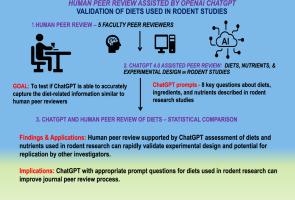应用人工智能辅助方法评估营养和健康研究中啮齿动物模型的饮食和成分配方。
IF 4.9
2区 医学
Q1 BIOCHEMISTRY & MOLECULAR BIOLOGY
引用次数: 0
摘要
利用人工智能(AI)进行同行评议正引起期刊和编辑委员会的兴趣,因为科学同行评议过程需要很长时间,而且需要大量的新投稿。人工智能的应用使用大型语言模型(LLM),如OpenAI的ChatGPT,是一种有效、快速的方法,可以搜索研究啮齿动物研究饮食的已发表文章。收集到的信息可用于在同行评议期间评估啮齿动物的饮食和营养,或用于开展研究和准备适当的实验设计,以便将来用啮齿动物进行营养和生物医学研究。然而,至关重要的是,人工智能只能用于补充和协助同行评审和最终出版决定的人类过程。ChatGPT的使用在改善科学同行评审和帮助研究人员开发营养研究的实验设计方面具有很大的潜力。我们的人工智能应用程序的目标是提高对为什么饮食和成分影响对啮齿动物代谢、生物化学、分子和基因表达、生理学、健康和疾病研究结果的解释的理解。人工智能应用于验证啮齿动物研究中使用的饮食方法,可以补充科学期刊的人类同行评审过程。本文章由计算机程序翻译,如有差异,请以英文原文为准。

Application of AI-assisted methodology to evaluate diet and ingredient formulations for rodent models in nutrition and health research
The use of Artificial Intelligence (AI) for peer review is gaining interest by journals and editorial boards because of the length of time required for the scientific peer review process and large numbers of new submissions. The application of AI using a large language model (LLM) like OpenAI’s ChatGPT is a valid, rapid means to search published articles that examine diets in rodent studies. The information gathered can be used to evaluate rodent diets and nutrients during peer review or in developing studies and preparing appropriate experimental designs for future nutrition and biomedical research with rodents. However, it is vital that AI be used only to supplement and assist the human process of peer review and the final decision for publication. The use of ChatGPT has great potential to improve scientific peer review and assist researchers in developing experimental designs for nutrition research. The target of our AI application is improving understanding of why dietary and ingredient effects impact the interpretation of findings in metabolism, biochemistry, molecular and gene expression, physiology, health, and disease research in rodents. AI application with LLM validating diet approaches used in rodent studies can complement the human peer review process of scientific journals.
求助全文
通过发布文献求助,成功后即可免费获取论文全文。
去求助
来源期刊

Journal of Nutritional Biochemistry
医学-生化与分子生物学
CiteScore
9.50
自引率
3.60%
发文量
237
审稿时长
68 days
期刊介绍:
Devoted to advancements in nutritional sciences, The Journal of Nutritional Biochemistry presents experimental nutrition research as it relates to: biochemistry, molecular biology, toxicology, or physiology.
Rigorous reviews by an international editorial board of distinguished scientists ensure publication of the most current and key research being conducted in nutrition at the cellular, animal and human level. In addition to its monthly features of critical reviews and research articles, The Journal of Nutritional Biochemistry also periodically publishes emerging issues, experimental methods, and other types of articles.
 求助内容:
求助内容: 应助结果提醒方式:
应助结果提醒方式:


